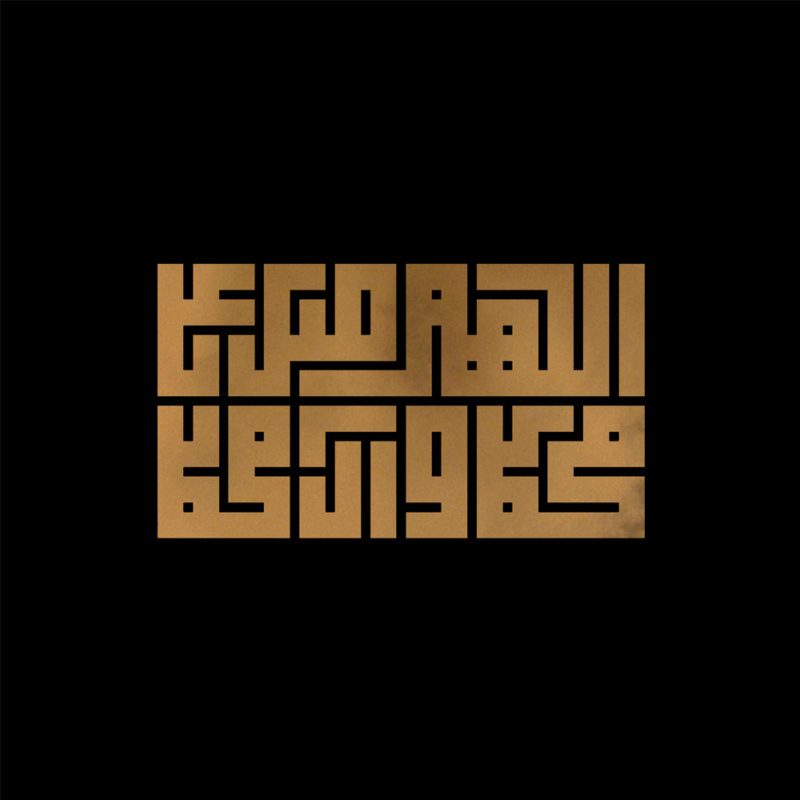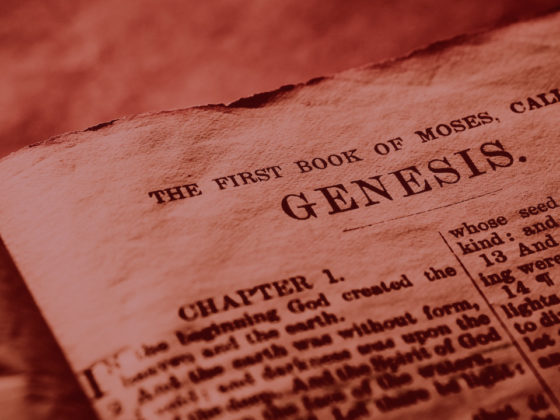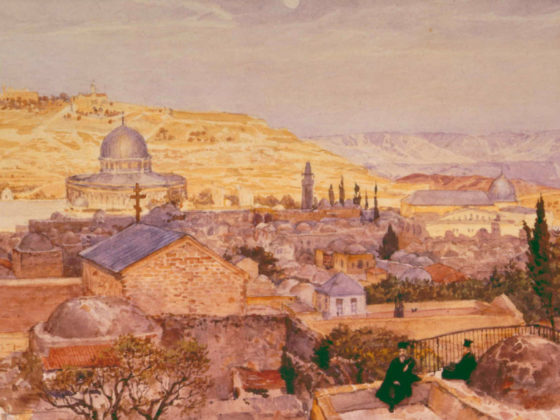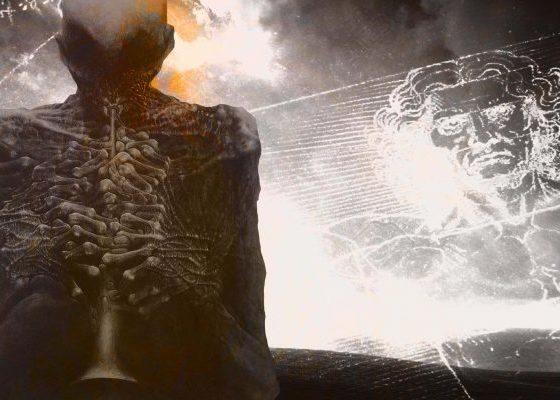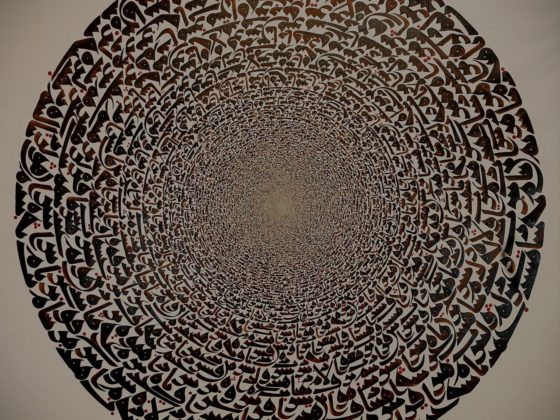The verses of the Qur’an and the hadiths of Ahl al-Bayt (A) teach us that Allah, in His essence, is beyond description and comprehension. The “essence” of Allah (dhatu Allah) refers to Himself as He is. This essence is Allah as He is, without any connection to creation. Therefore, the essence of Allah is beyond anything we can imagine, perceive, or express. In His essence, He is absolutely unknowable, invisible, and not encompassed by anything, and in no way limited.
In a khutbah delivered from the minbar of Kufa, Imam Ali (A) says:
“Thoughts that only liken Him to something that is not He do not comprehend Him, and the gaze does not see Him. After seeking Him, they return blinded. He is the One to Whom there is no end in His firstness, and in His finality there is no limit or boundary – time has not preceded Him, and there were no periods before Him, and neither increase nor decrease comprehends Him, and He is not described by place or position“
He continues:
“All things have humbled themselves before His splendor, and they have submitted to His power and glory. The glances of the eyes have grown weary from the vanity of contemplating Him, and the thoughts of created beings have crumbled to dust in their attempts to comprehend Him. The First before all things and the Last after all things! Nothing can compare with Him – He is Manifest over all things, by His power over them, and He is the Observer of all places, without being transported to them. No one who touches Him will touch Him, and no one who perceives Him will perceive Him. He is the One Who is God in the heavens, and He is God on earth; He is the Wise, the Knowing. He produced what He willed from His creation without any previous example or pattern, and no fatigue befell Him in the creation of the creation” (Reported in Saduq’s Tawheed).
In his sermon on monotheism, Imam Reza (A) says:
“The first step in any form of worship is to know Allah. The key to this knowledge lies in understanding His unity (tawhid). The law of Allah’s unity is the rejection of qualities, as reason indicates that every quality (ṣifāt) and thing described by quality is created. Everything created points to a Creator who does not have qualities and cannot be described by them. Every quality and thing described by one indicates a connection, and every connection suggests a change, and every change shows that it is not eternal, which would be beyond change. Whoever tries to understand the essence of Allah by comparing it to something else has not truly known Him. Those who talk about penetrating Him through cognition have not understood His unity. Those who compare Him to something have not grasped His truth. Those who set limits to Him have not spoken the truth about Him. Those who point to Him have not affirmed His immutability. Those who liken Him to something have not understood Him. Those who divide Him into parts have not diminished Him. And those who imagine Him to themselves have not understood Him“
Perhaps someone will ask: here the Imam (A) says that the essence of Allah does not have any attributes, but from other reports it is clear that Allah has attributes (qualities) of essence, such as being the Knowing, the Seer, the Hearer, the Living, and the Strong in His essence. We will come back to this and answer this question. In the meantime, let’s consider a few more hadiths that highlight the greatness and unknowability of the essence of Allah the Most High.
In the same sermon, Imam Reza (A) also says:
“Everything that exists in the creation does not exist in the Creator, and everything that is possible for it (the creation) is removed from its Creator“
This is a crucial rule: everything that can be said, presented, or described about the creations is not inherent to the Creator. Allah is completely free from everything that is inherent and characteristic of the creations. He is not similar to them in any way, and is completely different from them.
In another khutbah, which he delivered before the war with Muawiya, the Amir of the Believers, Ali (A) says:
“Praise be to Allah, the One, the Unique, the Self-Sufficient, the Ascended in His Unity (mutafarrid). He did not arise from anything nor did He create being from something pre-existing! By His power, He separated Himself from things and separated things from Himself. He has no attribute (sifat) that can be grasped (by thought), and He has no limit by which one could bring a likeness to Him. In describing Him, all expressions and languages are weak, and all conjugations of qualities are lost there. The depths of thoughts and their directions are confused in His kingdom, and all interpretations are shattered in their attempts to penetrate His knowledge. Veils of secrets are thrown over His guarded secret, and in the simplest of matters, the closest of close secrets, the most ambitious of minds are lost.
Blessed is Allah, Whom the soaring of conjectures does not reach, nor the diving of thoughts touches! Exalted is Allah, Who has no reckonable time, nor extended period, nor limited quality! Glorified is He, Who has no first beginning, nor final limit, nor final end! Glorified is He and such as He has described Himself; and those who describe His qualities will never reach Him. He limited all things in their creation, lest they should resemble Him, nor He resemble them. And He is not dissolved in them, so that it may be said,”He exists in them,”nor apart from them, so that it may be said,”He is separated from them,”nor outside of them, so that it may be said,”Where is He?”But He, exalted is He! — has encompassed them with His knowledge, established them with His creation, and counted them with His preservation. Neither the secrets of hidden thoughts, nor the hidden darkness of the dark nights, nor what is in the highest heavens, nor what is in the lowest of earths, escape Him. He is the Guardian and Watcher of all things. Everything is encompassed by another thing; but Allah — the One, the Unique, the Self-Sufficient — encompasses all that encompasses. The change of times does not change Him, nor does the creation of what has being tire Him. He only says to that which He wills to be,”Be,”and it is.”
Sahl ibn Ziyad reported that the tenth Imam, Ali ibn Muhammad al-Hadi (A), said:
“Ya Allah, the thoughts of those who ponder have gone astray, the guesses of those who guess have been shattered, the descriptions of those who describe have become confused, and the words of those who have gone astray in trying to understand Your wondrous position have disappeared! Is there any way to penetrate into the perfection of Your exaltation, while You are in a place that knows no limit? And the eyes do not reach You — neither by indication nor by expression. Never! Never! O First! O One! O Unique! You have ascended in exaltation with Your great glory and have risen with the kingdom of Your magnificence above all abysses and limits!“
In the hadiths, it is stated that understanding the phrase “Allahu Akbar” as “Allah is above everything” is incorrect. A man said near Imam Sadiq (A): “Allah is above everything (Allahu Akbar)”
The Imam (A) asked: “Allah is above what?”
The man replied: “above All things”
The Imam (A) then said: “You have limited Him”
The man inquired: “How should I say it?”
The Imam replied: “Say it like this: ‘Allah is above being described'”
Therefore, the words “Allahu Akbar” do not mean that Allah is above all things. If this were the case, there would be some common measure or similarity between Him and things. One could then understand that He is similar to these things, but superior to them. The true meaning of these words is that “Allah is above being described.”
This is the pure Tawheed regarding the essence of Allah, which the Ahl al-Bayt (A) has conveyed to us. The pure essence of Allah (i.e., Allah Himself) cannot be described using any words, thoughts, or ideas, and He does not possess any attributes. Imam Reza (A) says: “The perfection of Tawheed is the denial of attributes from Him.” (This is reported in the Tawhid of Saduq). A similar hadith is reported from Imam Ali (A) in Nahj al-Balagha: “The truth of Tawheed is the denial of attributes from Him.”
It is narrated from Imam Sadiq (A):
“Allah is the Limit of all that has a limit and the Giver of a limit, but He Himself has no limit. He has established His unity through His Lordship (rububiyya) and described Himself through infinity. Therefore, the Allah who is mentioned, the one who is described in some way, is not the same as Allah. And every thing that is called by a name that is not equal to itself is created. Do you not see how He said: “Greatness belongs to Allah” and “Glory belongs to Allah”? And He said: “To Allah are beautiful names; call Him by them” (7:180). And He said: “Call upon Allah or call upon the Most Merciful; by whatever name you call, His are the best names” (17:110). So names are added to Him, but He is one in pure unity.
Imam Sadiq (A) also says:
“The name of Allah is not Allah Himself, and every thing that has a name is created, except Allah… The Creator of things cannot be described so that He becomes named. He was not formed or produced in order to know His attributes from the production of someone else, and everything that reaches the limit is not He. Whoever understands this judgment will never experience humiliation! This is pure Monotheism: observe it, believe in it, and understand it by the permission of Allah… Allah is called by names, but He is not these names, and the names are not He, and the described is not the one describing”
(Tawhid by Saduq, hadith 185).
How do we understand that the essence of Allah is beyond all names and attributes, and that “the perfection of Tawhid is the denial of the attributes from Him“?
This should be understood as a denial of the idea that there are multiple attributes within Allah. We would say that Allah is not the Knower, the Powerful, the Seer, the Hearer, etc., but rather that these qualities are all part of the one and unknowable essence of Allah. When we talk about the attributes of the essence of Allah, we mean synonyms, not different qualities. If we meant different things, it would imply that there are multiple aspects to Allah’s essence. All attributes that imply multiple or different things are attributes of action. Therefore, the attributes of the essence are actually synonyms because they cannot refer to different realities. It cannot be that “the Knower” means one thing and “the Powerful” means something else. If we did, Allah would be composed of parts, just like Christians believe that God is one in three persons.
If we say that Allah is “one in the multitude of ṣifāt”, this is clear shirk, as we have already mentioned. This is the aqidah of the Nasibis, enemies of Shia and Ahl Al-Bayt (A).
Therefore, all the attributes we understand about Allah are attributes of action. The differences between them refer to the different actions and outcomes these attributes bring about. However, in reality, they are one in the essence of Allah, which we know is absolutely unknowable. Yes, we can know about it as He has described Himself, but this description is not a revelation. These attributes are just indications of the consequences of the action of His essence.
As Imam Reza (A) says:
“His names are explanation (taabir), his attributes are indication for understanding (tafhim)“
If we understand the meaning of some ṣifāt (attribute), it doesn’t mean that it is the essence of Allah. The essence of Allah is comprehensible only to Himself. If the creation could comprehend Him with their knowledge, He would not be eternal because everything that can be comprehended and embraced by the creation is itself a creation.
When Allah is called “Knowing”, “Alive”, or “Strong”, it’s correct to say that He is Knowing by His essence, Alive by His essence, and Strong by His essence. But if we say that He is Knowing in the meaning of this word, Alive in the meaning of this word, and Strong in the meaning of this word in His essence, then this would be a limitation of Him. This means attributing difference and differentiation to His essence and making Him comprehensible to the creation. Then it would turn out that we embrace His essence with our knowledge, and Allah is above that.
Imam Sadiq (A) says: “He is the Hearer, the Seer, the Knower, the Aware, without distinction in essence and meaning“
This is where the Sufis went astray. They said that creation is a manifestation of the attributes of Allah. For example, the goodness of creations reflects the attribute of Allah “Kind,” mercy reflects the attribute of Allah “Merciful,” and knowledge reflects the attribute of Allah “Knowing.” But creation doesn’t reflect the essence of Allah in anything. It is a consequence and a result of Allah’s action, not of the attributes of His essence. This is similar to how writing is a result of the movement of the writer’s hand, not a manifestation of the writer himself (his essence). From the written letters one can only understand that the movements of the writer’s hand were such and such, but one cannot understand what he is like in himself: tall or short, good or evil.
So, once again, the meaning of the words “the perfection of Tawheed is in the denial of the attributes from Him” is in the denial of the plurality of attributes, not of the attributes themselves. We would say that He is not the Knower, the Powerful, the Seer, etc. No, He is the Knower, the Powerful, the Seer, the Hearer, but not in the sense of a plurality of attributes within Him. What is described through Knowledge is the same as what is described through Power, what is described through Power is the same as what is described through Life, and this is His eternal and unknowable essence, hidden from all creation. And if any of these attributes has a specific meaning that we understand, then this meaning always refers to His action, not to His essence. These names indicate Him, that is, what He is like based on His actions, but they do not reveal what He really is. If we attribute these attributes to the essence of Allah, then we must say that they are all synonyms and mean the same thing. If we say that they mean different concepts, then we are talking about attributes of action, not essence.
Let’s put it more simply. Suppose I described Allah as “majestic.” This is His attribute, greatness. However, when I used this word to describe Him, I applied a description that is itself created. Any description we can apply to Him will be a creation because we ourselves are creations and we only know creations. So, the very attribute of “greatness” that I used to describe Allah is created and refers to creation, not to Allah.
Any meaning I give to the word “greatness” will be based on what we see in creation. For example, one person might understand “greatness” as something huge, while another might imagine someone who has this quality. But all this is not Allah. Greatness is nothing but a creation of Allah, the result of His action. So how can Allah be described as “great” if He Himself created all greatness?
The true understanding of this is that we use the word “great” as an indication of Him, not as a revelation of Himself. Let’s look back at the hadith of Imam Reza (A):
“His names are explanations (taabir), His asifats are indications for understanding (tafhim).” His asifats are an indication of Him, not He Himself.
I cannot say that Allah is great in the sense that I understand it, or that He is great in the meaning of the human word “greatness.” This would be shirk, attributing to Him the qualities of creation. But I can say that since He created all greatness and every greatness is the result of His action, then He Himself cannot be insignificant or weak, and therefore He is great. His asifat of “great” here is an indication of Him, not a revelation of His essence.
In the same way, we know that God created a beautiful world, and therefore we call Him “Beautiful.” We know that the ignorant do not create a wise creation, and therefore we call Him “Wise.” We know that the dead do not create life, and therefore we call Him “Living.” We know that the ignorant do not create knowledge, and therefore we call Him “Knowing.” And we know that he who does not exist cannot create being, and therefore we say that He is.
In other words, we know that He is good because His actions are good, and the actions of the unkind are not good. We know that He is wise because His actions are wise, and the actions of the unwise cannot be wise. And so on… But what He is in Himself, we do not know and will never know, forever and ever.
As another hadith from Imam Reza (A) says:
“By saying: ‘Allah is strong’, you (in reality) say that nothing weakens Him, and by doing so you have rejected every weakness from Him, and made weakness something outside and besides Him. And the same is your word about Him: ‘Knowing’ – by doing so you have rejected every ignorance from Him and made ignorance something outside and besides Him“
A question arises: if the essence of Allah, as we have said, is absolutely unknowable, then how is Allah known? We will talk about this in the next part.
